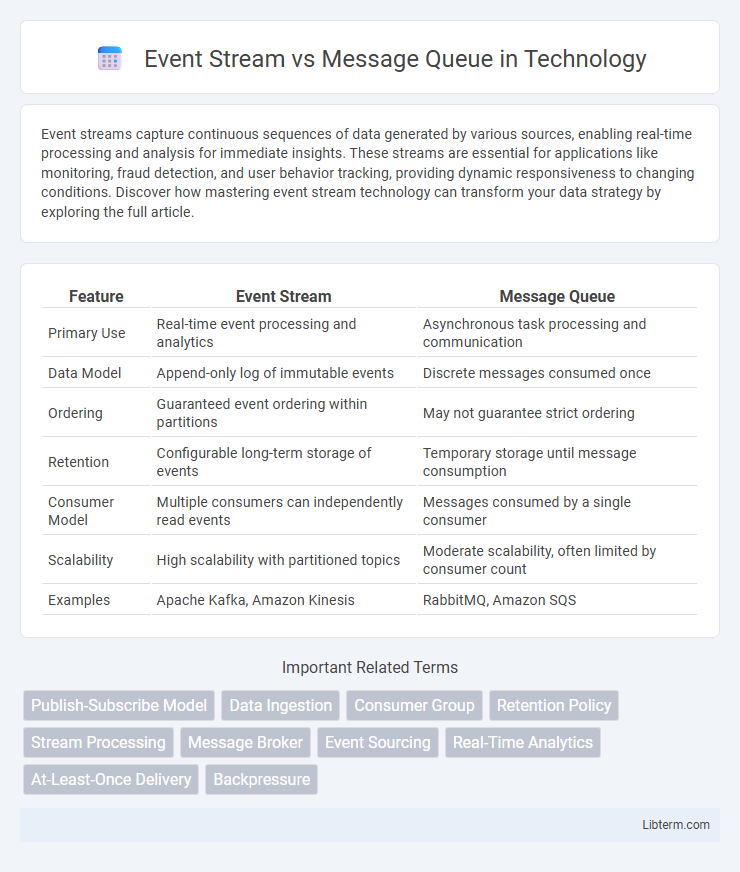Event streams capture continuous sequences of data generated by various sources, enabling real-time processing and analysis for immediate insights. These streams are essential for applications like monitoring, fraud detection, and user behavior tracking, providing dynamic responsiveness to changing conditions. Discover how mastering event stream technology can transform your data strategy by exploring the full article.
Table of Comparison
| Feature | Event Stream | Message Queue |
|---|---|---|
| Primary Use | Real-time event processing and analytics | Asynchronous task processing and communication |
| Data Model | Append-only log of immutable events | Discrete messages consumed once |
| Ordering | Guaranteed event ordering within partitions | May not guarantee strict ordering |
| Retention | Configurable long-term storage of events | Temporary storage until message consumption |
| Consumer Model | Multiple consumers can independently read events | Messages consumed by a single consumer |
| Scalability | High scalability with partitioned topics | Moderate scalability, often limited by consumer count |
| Examples | Apache Kafka, Amazon Kinesis | RabbitMQ, Amazon SQS |
Introduction to Event Streams and Message Queues
Event Streams capture real-time data flows, enabling continuous processing of events as they occur, which is essential for applications requiring immediate insights. Message Queues store and forward messages to ensure reliable delivery between distributed systems, commonly used for decoupling components and managing asynchronous communication. Both technologies facilitate data exchange but differ in handling event timing and storage persistence.
Core Concepts: What Are Event Streams?
Event streams represent continuous flows of data generated by sources such as user activities, sensors, or applications, capturing real-time changes as a sequence of events. Each event in a stream is immutable and ordered, enabling systems to process data in a time-sensitive manner for analytics, monitoring, or event-driven architectures. Unlike message queues that typically store and forward discrete messages for task distribution, event streams provide a durable, replayable log of events essential for complex event processing and stateful applications.
Core Concepts: What Are Message Queues?
Message queues are communication mechanisms that enable asynchronous data exchange between distributed systems by temporarily storing messages in a queue until the receiver processes them. They ensure reliable, ordered delivery of discrete messages, supporting decoupled application components and load balancing. Core features include message persistence, acknowledgment protocols, and support for various messaging patterns like point-to-point and publish-subscribe.
Key Differences Between Event Streams and Message Queues
Event streams capture continuous flows of data, enabling real-time processing and analytics, while message queues focus on reliable message delivery with ordered processing and guaranteed consumption. Event streams support high-throughput and event replay capabilities, making them ideal for event-driven architectures and data integration scenarios. Message queues prioritize decoupling of systems, ensuring message durability and load balancing across consumers for reliable task execution.
Use Cases Best Suited for Event Streams
Event streams excel in real-time analytics, monitoring systems, and continuous data processing where high-throughput and low-latency data flow is critical. Use cases such as fraud detection, IoT sensor data analysis, and live user activity tracking benefit from the ordered, immutable sequence of events that event streaming platforms provide. Event streams enable seamless integration with machine learning models and alerting systems to react instantly to emerging patterns and anomalies.
Use Cases Best Suited for Message Queues
Message queues are best suited for use cases requiring reliable, asynchronous communication between distributed systems, such as order processing, task scheduling, and decoupling microservices to enhance fault tolerance. They excel in scenarios demanding guaranteed message delivery, ordered processing, and load balancing, often seen in financial transactions and inventory management. Message queues ensure durability and message acknowledgment, making them ideal for workflows that cannot afford message loss or duplication.
Performance and Scalability Comparison
Event streams deliver high-throughput, low-latency data processing by continuously capturing and processing events in real-time, making them ideal for scenarios requiring rapid data ingestion and analysis. Message queues handle asynchronous communication with guaranteed message delivery and ordering, but typically introduce higher latency due to message persistence and acknowledgement processes. Scalability in event streaming platforms like Apache Kafka allows for partitioned, distributed processing across multiple nodes, whereas message queues often face bottlenecks under heavy load due to limited parallelism and sequential consumption models.
Data Integrity and Ordering Guarantees
Event streams provide strong ordering guarantees by preserving the sequence of events as they occur, ensuring that data is processed in the exact order of generation. Message queues often offer at-least-once delivery but may require additional mechanisms to enforce strict ordering, which can complicate data integrity. Event streams' immutable log structure enhances data integrity by enabling consumers to replay and audit events without risk of loss or tampering.
Popular Technologies: Kafka vs RabbitMQ (and Others)
Kafka excels in high-throughput event streaming with its distributed, partitioned log architecture, optimized for real-time data pipelines and event-driven applications. RabbitMQ, a robust message queue, specializes in reliable message delivery with flexible routing via exchanges, ideal for complex messaging patterns and asynchronous processing. Other notable technologies include Apache Pulsar, combining multi-tenant event streaming with message queuing features, and Amazon Kinesis, designed for scalable real-time data ingestion and processing.
Choosing the Right Solution for Your Architecture
Event streams provide real-time data processing by capturing continuous sequences of events, ideal for applications requiring immediate insights and high throughput. Message queues ensure reliable, ordered delivery of discrete messages, making them suitable for asynchronous communication and task coordination in distributed systems. Selecting between an event stream and a message queue depends on architectural needs such as latency tolerance, data ordering, scalability, and system decoupling requirements.
Event Stream Infographic

 libterm.com
libterm.com